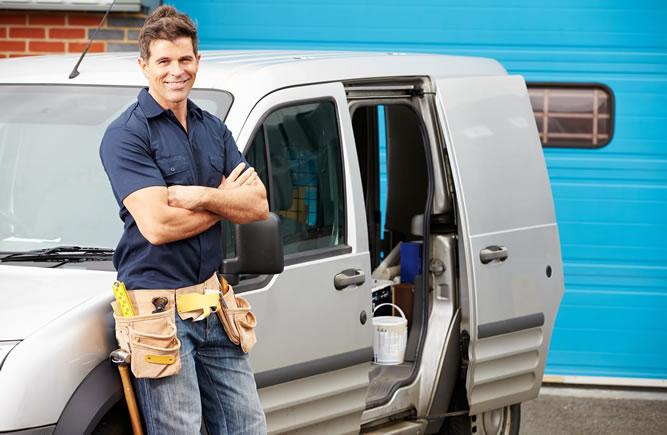Central Heating Installation Cost
Last updated 10th June, 2025
Want to know more about central heating installation costs?
This article discuses all you need to know about new central heating system prices. Whether you need a new boiler or a complete overhaul of your central heating we've got you covered!
Let's get started!
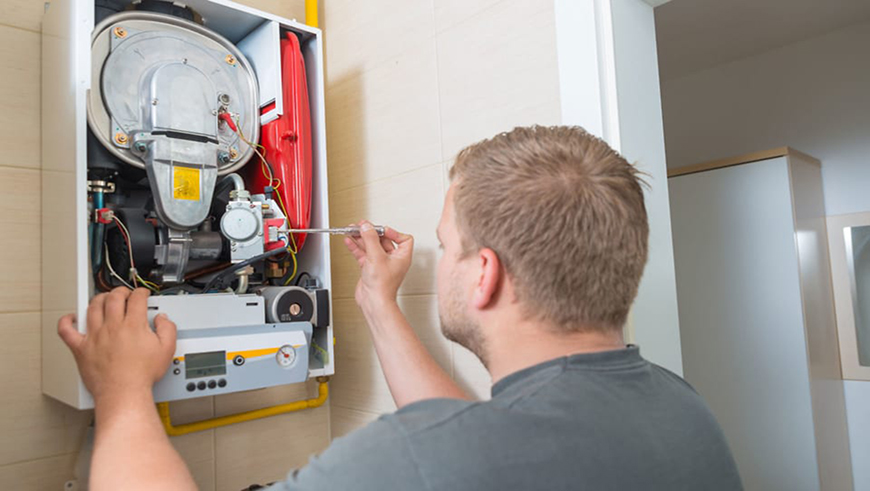
Table of Contents
- How much does central heating cost to install?
- Central heating installation prices
- Supply cost of central heating installation
- Additional costs when installing central heating
- Labour cost to install central heating
- Factors that impact central heating installation costs
- What does installing a new central heating system involve?
- Types of central heating boilers
- Types of central heating radiators
- DIY central heating system installation
- Building regulations & planning permission
- How to find & hire a heating engineer
- FAQs
How Much Does Central Heating Cost to Install?
The price can vary depending on several things, including the type and brand of boiler, the location within the property, and the type of company/contractor used.
If you're installing and replacing your boiler with a brand new central heating system, it can cost between £1,500-£3,000, as well as saving up to £350 per year on energy bills.
Central heating installation and replacements are not to be done as a DIY job. The job needs to be completed by a qualified and Gas Safe registered engineer due to the strict safety regulations that come with a boiler and central heating in general.
Central Heating Installation Prices
There are lots of different boilers and central heating installations to choose from when deciding what is best for your home. Below are the average central heating installation costs for various boiler types with the added labour costs included.
| Type of boiler | Average Cost |
|---|---|
| Conventional boiler | £1,000-£1,500 |
| Combi boiler | £1,500-£1,800 |
| Condensing boiler | £1,800-£2,500 |
| System boiler | £2,000-£2,800 |
| Electric boiler | £2,000-£3,000 |
| Biomass boiler | £7,500-£10,000 |
New Heating System Cost Breakdown Calculator
Individual Costs of Installing a new central heating system with a combi boiler - Total Cost: £2250
Materials
£1,575
Tradespeople
£675
Waste removal
£0
Supply Cost of Central Heating Installation
New Boiler Cost
When pricing up a new boiler installation, a large part are the decision is based around manufacturing costs and the type of boiler you choose, whereby the price and quality can vary between brands.
Below are a range of supply-only costs (without the cost of labour), displaying estimated boiler prices when they are bought separately.
| Type of boiler | Average Cost |
|---|---|
| Conventional boiler | £400-£800 |
| Combi boiler | £500-£1,000 |
| System boiler | £800-£1,600 |
| Condensing boiler | £1,000-£2,000 |
| Electric boiler | £1,500-£2,500 |
| Biomass boiler | £5,000-£10,000 |
Central Heating Radiator Supply Costs
As well as deciding upon a boiler, establishing the cost to install a new central heating system will also depend on the type of radiators you need for your property. Below is the average cost for radiators of various different styles available.
| Type of Radiator | Typical Cost (Supply Only) |
|---|---|
| Single Panel | £50–£150 |
| Double Panel | £70–£200 |
| Column Radiator | £150–£400 |
| Horizontal Radiator | £60–£180 |
| Heated Towel Rail | £50–£250 |
Additional Costs When Installing Central Heating
There may be additional costs involved when installing a new central heating system, and whilst you have a qualified engineer in your home, it's the perfect chance to book in for other household jobs or get them done at the same time.
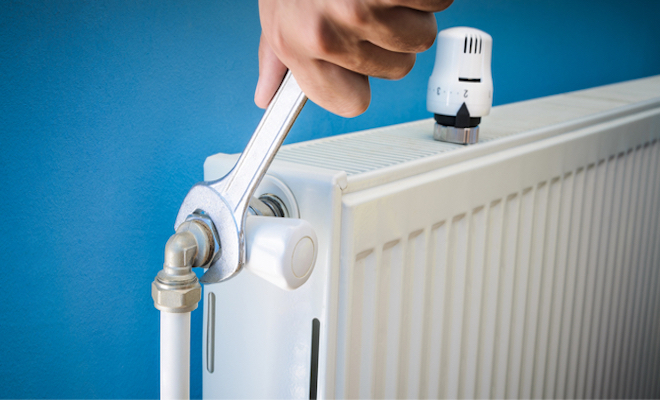
Below are some additional jobs that you may need to consider when booking in with your contractor.
| Job description | Average Cost |
|---|---|
| Bleed the radiators | £70-£120 |
| Installing a new central heating thermostat | £150-£250 |
| Replacing the radiator | £150-£300 |
| Fitting a heated towel radiator | £150-£200 |
| Pipework installation | £500-£1,000 |
| Installing underfloor heating | £1,000-£2,000 |
| Installing a septic tank | £1,500-£3,000 |
Labour Cost to Install Central Heating
Individual labour costs and the length of time it takes to install a new boiler can alter the price depending on which brand and heating engineer you've decided on.
The average labour costs are typically between £500-£1,500. The price generally tends to fall higher if the make of your boiler is different from your previous boiler, making for a brand-new installation.
The location of your boiler within your house can also affect the cost, as the job itself will take longer if the location is difficult to access.
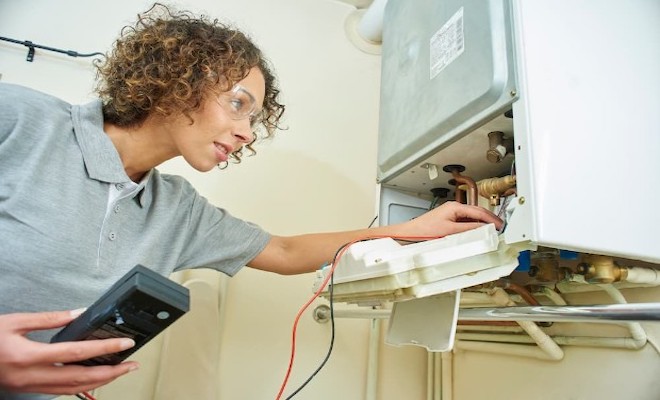
A straightforward replacement of the same make boiler or a fresh installation can take as little as 1-2 days, whereas changing your boiler to a new make can take between 3-4 days.
If you're looking to change the type of boiler and fit into a new position within your home, this can take a week if needed.
Make sure to check with your heating engineer before the job goes ahead so you can make efficient plans and arrangements for your needs.
Factors That Impact Central Heating Installation Costs
The cost of installing a new central heating system is not a straightforward set price. There are a whole range of cost affecting factors when having a boiler installed.
Below is a list of the most common factors that can alter the price range of your new central heating system and how much you can expect it to cost.
Boiler Brand
There are several popular boiler brands that you can choose from for your home installation, including Baxi, Viessmann, Worcester Bosch, Vaillant, Ideal, Glow-Worm, and Ravenheat - to name a few.
Make sure to browse around at each brand so you can compare prices, check if they have a warranty, or research any additional features.
Type of Boiler
When choosing the type of boiler you want to install, ensure that you've researched all the options and spoke to your heating engineer so that you're picking the right one for your home.
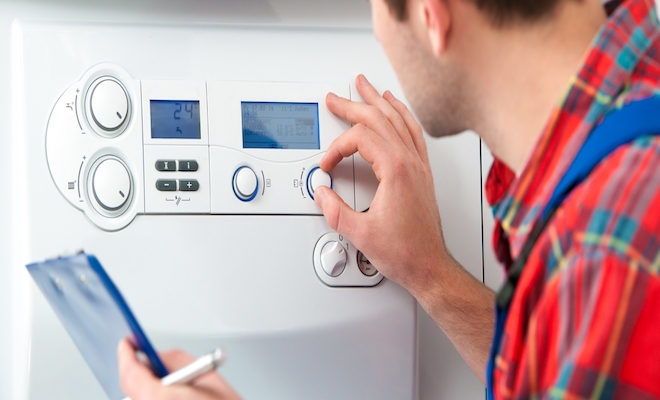
A conventional boiler is usually the cheapest option, with a combi boiler in close second, both being less than £1,000. Whereas, if you install a biomass boiler, you're looking at paying up to £10,000 in some cases.
Type of Replacement
If you're removing and replacing your boiler with the exact same make, then this can make the overall cost a lot cheaper.
However, if you're looking to install a brand-new boiler in a new location within your home, this can increase costs due to the time frame, extra materials, and waste removal.
Not only that, but the cost of moving a boiler can also include additional plumbing work, as well as gas or electric in order for it to be in working order.
What Does Installing a New Central Heating System Involve?
It's important to know what to expect when you're welcoming a heating engineer into your home and how to best prepare for the job.
Once you've decided on the right contractor, here is what you can expect to go down during your new central heating system installation.
Removing the Old Boiler
Firstly, they will take out your old boiler and extract it from your home. This is often a straightforward job if your boiler is easy to access and take out of your home but may take longer depending on the previous system's complexity and location.
Clean and Flush Your System
Your heating engineer should flush out and clean your system with a thorough clean, according to British Standards.
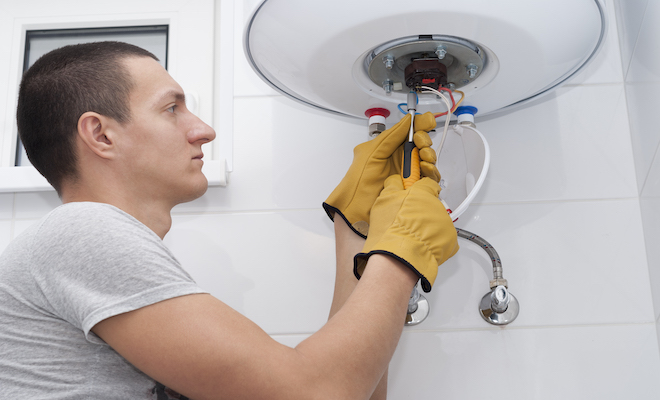
It's important to check with your contractor if they will include this in the installation process, as this will prevent your new boiler from being damaged by any dirt and debris.
They'll also check if you need to upgrade or change your pipework which can add extra time and costs onto the job.
Fit the New Boiler
Once everything has been cleaned, cleared and checked, it's time to install the new boiler. Again, this is usually straightforward unless the new system is being moved to a new location or difficult position.
Your engineer will probably recommend having a system filter installed to protect your new boiler from a buildup of any dirt, debris or sludge that makes its way into the system. You can also purchase a flue and filling loops if needed.
Handover
Your engineer will commission the system to double-check that everything is working correctly before completing a handover with you or the homeowner.
This will make sure that you're fully aware of how to operate the new heating system, showing you the controls and how to check any necessities, including bleeding your radiators and topping up the pressure.
Finally, you'll register your boiler with the manufacturer to ensure your warranty is correct and that the warranty covers you.
Types of Central Heating Boilers
There are a range of boilers for you to choose from when deciding on a new central heating system. Below is a list of the different types of boilers, accompanied by their advantages and disadvantages.
Conventional Boiler Costs
A conventional boiler typically costs between £500-£1,000
A conventional boiler is usually the cheapest option out of the different types of boilers. They are perfect for big homes as they cover a large base with two cylinders, with one heating the water and the other storage water.
Pros
- ✔ Great water pressure
- ✔ Heats big spaces and large homes
- ✔ Cheaper option
Cons
- ✖ Not ideal for flats or small homes
- ✖ Needs double water cylinders
Combi Boiler Costs
A combi boiler typically costs between £500-£1,000.
Combi boilers are typically the most popular choice for homeowners because they're compact and can fit into a small space whilst taking water straight from main lines, either with both gas or electricity.
Pros
- ✔ Compact
- ✔ Works with gas or electricity
- ✔ Connected to mains
- ✔ Can fit into small spaces
Cons
- ✖ Lose both the water and heating if the boiler breaks down
- ✖ Weak water pressure during multiple uses
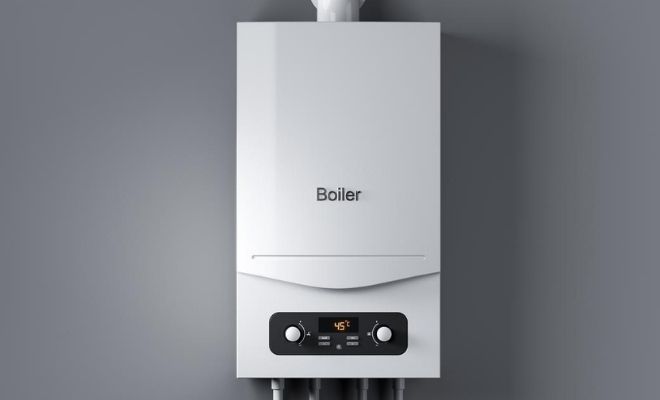
Electric Boiler Costs
An electric boiler typically costs between £1,500-£2,000.
Electric boilers are a fantastic eco-friendly and energy-efficient option for homeowners and can run at up to 100% efficiency.
Pros
- ✔ Environmentally friendly
- ✔ Energy efficient
- ✔ Easy to use
Cons
- ✖ Not efficient for a high heat
- ✖ May need a sizeable cylinder
Condensing Boiler Costs
A condensing boiler typically costs between £1,200-£2,000.
If you're looking for a cheaper option that can cut down heating bills cost, a condensing boiler is a good choice as they utilise your waste heat within the flue gases to heat up cold water before use.
Pros
- ✔ Works with either gas or oil
- ✔ Brilliant water pressure
- ✔ Efficient
Cons
- ✖ May need a sizeable cylinder and water tank
- ✖ Needs a draining system
System Boiler Costs
A system boiler typically costs between £1,500-£2,500.
System boilers are fairly similar to that of a combi boiler as it doesn't need a water tank and can be used for several taps without hindrance to the water pressure at all.
Pros
- ✔ Great water pressure on all taps
- ✔ Doesn't need a water tank
- ✔ Fast response
Cons
- ✖ Can take up space
- ✖ Isn't as energy efficient
Biomass Boiler Costs
Biomass boilers are a more expensive but high-quality boiler option and are an ideal choice for those looking for the most environmentally-friendly choice.
You can save up to nearly 50% on energy bills as they produce energy through burning logs, wood chips or pellets to heat water. A biomass boiler typically costs between £7,000-£10,000.
Pros
- ✔ Long-term investment
- ✔ Environmentally friendly
- ✔ Brilliant water pressure
- ✔ Energy efficient
Cons
- ✖ May need a sizeable cylinder and water tank
- ✖ Expensive upfront cost
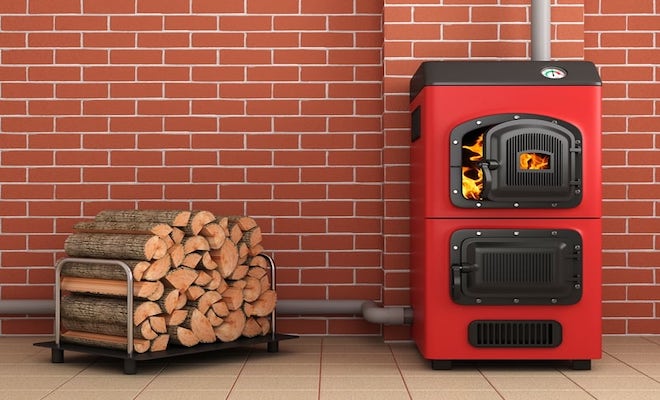
Types of Central Heating Radiators
There are a range of radiators for you to choose from when deciding on a new central heating system. Below is a list of the different types of radiators, accompanied by their advantages and disadvantages.
Single Panel Radiators
A single panel radiator typically costs between £50–£150.
Single panel radiators are a standard and simple radiator choice. They're mounted to a wall and face outwards and can be divided into several columns. They are slender in size and can touch the wall at a closer angle than most other radiators.
Pros
- ✔ Affordable and widely available
- ✔ Compact and space-saving
- ✔ Relatively easy to install
Cons
- ✖ Lower heat output compared to double panels
- ✖ May not provide sufficient heat for larger room
- ✖ Simple design lacking aesthetic appeal
Double Panel Radiators
A double panel radiator typically costs between £70–£200.
Double panel radiators are the same as single but consist of two single panels stacked up next to each other, offering more heat. However, they can stick out further away from the wall, which may be preferred in some household designs.
Pros
- ✔ Greater heat output than single panels
- ✔ More efficient at heating spaces quickly
- ✔ Suitable for medium to large rooms
Cons
- ✖ Bulky and stick out from the wall
- ✖ Slightly higher cost compared to singles
- ✖ Can prove difficult to clean behind
Column Radiators
A column radiator typically costs between £150–£400, depending on size and style.
Column radiators are a traditional choice of radiator and are designed with rows of tubes that join at the top and bottom to make a single file. These are often found in Victorian homes and give a historic school feel.
Pros
- ✔ Provides good amount of heat output
- ✔ Suitable for period or traditional homes
- ✔ Available in a variety of sizes
Cons
- ✖ More expensive than standard radiators
- ✖ Can be relatively bulky, taking up space
- ✖ Take longer to heat up compared to panel radiators
Horizontal Radiators
A horizontal radiator typically costs between £60–£180.
Horizontal radiators are a perfect choice to slot in underneath window sills and are cheaper due to their small fit. They are great for a variety of different rooms and perfect for warming up a room with several windows looking out to the cold.
Pros
- ✔ Ideal for installing under a window
- ✔ Cost-effective when space is limited
- ✔ Widely available and relatively common
Cons
- ✖ Not ideal when there's a lack of wall space
- ✖ Limits where you can put your furniture
- ✖ Fewer design options compared to vertical radiators
Heated Towel Rails
A heated towel rail typically costs between £50–£250, depending on design and finish.
Heated towel rails are typically used for bathroom usage and are designed in a ladder form to warm up towels after morning showers on a cold winter day. They can be used to heat a small room also but shouldn't be relied on solely for heating.
Pros
- ✔ Keeps towels warm and dry
- ✔ Ideal for bathrooms and shower rooms
- ✔ Stylish and available in many finishes
Cons
- ✖ Limited heat output not suited to larger rooms
- ✖ Typically used in conjunction with radiators
- ✖ Can become expensive depending on the design
DIY Central Heating System Installation
A DIY central heating system installation is not possible, even for the best DIY enthusiast. You have to have your new boiler installed by a proficient heating engineer on the Gas Safe Register.
Don't be fooled. Even if you're not installing gas central heating, you still should not take this on as a DIY job due to the complexity and potential dangers involved if not done correctly.
Several potential consequences are involved when installing a new boiler, including poor installation, gas leakages, and piping issues.
You'll also not be able to sell or rent your home out until you have your whole system examined and checked off by a qualified engineer.
Building Regulations & Planning Permission
When installing a new central heating system, it needs to be Building Regulations approved and installed by an engineer registered under an approved government scheme, including the Gas Safety Register, Competent Person Schemes for gas, oil and fuel boilers.
Your installer should ensure that your boiler reaches the appropriate efficiency rating:
- Gas boilers: Minimum efficiency of 86%
- Oil Boilers: Minimum efficiency of 85%
If you're unsure, check out the guidelines here or talk to a professional before going ahead with the job.
You can also talk to your local authorities for their guidance if you need to install a tank for any oil-fired heating systems or if your heating has been installed by someone who is not approved by Building Regulations.
If this is the case, then you will need to contact them to give notice of a new and qualified installation, as well as a notification fee to get checked out and receive a building regulation completion certificate.
You won't need any planning permission when installing or replacing a new heating system if all the work is done inside your home. However, if you live in a listed building or near a conservation site, it's best to check with the local planning authority.
How to Find & Hire a Heating Engineer
When you're looking to hire a heating engineer, you may be unsure about what you're looking for, what to ask and things you need to consider.
Hiring the right person for you is important for a smooth installation process so that you feel comfortable and safe with the job being done.
If you're unsure, then don't worry, we're here to help! Below is a list of the most common things you'll need to consider as you're searching for the right heating engineer for you.
- How much will it cost? - Ask each contractor you speak to for a breakdown of costs, and make sure to browse around and get several quotes from different installers so you can compare prices.
- Do they have guarantees? - Make sure to ask whether they offer any guarantees with their work, such as warranty or refund periods.
- Are they experienced? - Don't be shy to ask if they have previous experience fitting the style/model of boiler that you want, asking for references, quotes or pictures from previous clients if needed.
- Are they on the Gas Safety Register? - It is so important to check if your potential heating engineer is complying with Building Regulations as this can be a dangerous job, and you want it done the right way. Ask for proof if you're unsure, as this could turn into a legal matter and affect you negatively if incorrect.
- What types of boilers can they fit/do they offer? - This should be one of the first questions you ask, as not all contractors may be able to fit the exact boiler that you want. They may guide you through their options, and you can make the best-informed decision based on your needs.
FAQs
A power flush includes cleaning chemicals that move along the pipes and system to get rid of the buildup of dirt, debris, rust, and sludge.
It can take up to a day to complete a successful power flush, depending on the state and size of your system. It's best to let the professionals deal with this job to avoid any mishaps.
Each individual system will have its own unique benefits, so always ensure research when checking out new central heating system prices.
However, not all systems are the same, so you should always read through the specific manual or look it up online, and if you're still unsure, then get in touch with your engineer or the manufacturer for help.
However, not all systems are the same, so you should always read through the specific manual or look it up online, and if you're still unsure, then get in touch with your engineer or the manufacturer for help.
There will also be lots of noise, heating issues and potential water suspension, so it's best to find a hotel or a family/friends house to stay at until the job is completed safely.
If there is minor flue damage or noise issues, you can expect to pay around £150 , but if there are serious issues with leaking, a bad smell, or a damaged heat exchanger, you may be paying up to £500 in repair costs.
However, if you get your boiler regularly checked and serviced, then you may be able to avoid this shock altogether.
